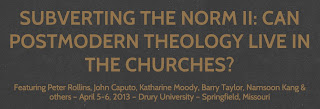In reading a recent critique of a Radical Theology conference, framed as privileged religious discussions, I read some good points. The ongoing critiques of postmodernity because of ethnic concerns is at point frustrating. It is true that postmodernity is primarily a "white, western" concern, but at the same time, we can't ignore that postmodernity is primarily a cultural force that is shaped, owned and entered into by white, western cultures - emphasis on primarily.
The reason is that it is a rejection of "modernity" - something that very few cultures outside of the western world had to endure following the Enlightenment. It is fair to critique movements like Radical Theology for being white, male and privileged, but always with a nuance that the modernity/postmodernity shift is primarily a Western issue.
If you haven't been marred and de-humanized by modernity then you don't need to return from it. This does not mean that non-western cultures have not been de-humanized or oppressed by the influence of modernity on the Western world, but that the ability to oppress and de-humanize the other is in direct correlation to the internally destructive forces of modernity that the Western culture then externalized into projection - self-hatred became hatred of the other, self-effacing dehumanization became subjugated de-humanizing of the other. We need the non-western world to heal from this derangement - i.e. Liberation Theology, but we also need internal conversations and reparative therapy - i.e. Radical Theology, Derrida, Rollins, Foucault, Zizek, etc.
In many ways, postmodernity is a return to a kind of situated tribal affiliation posture that allows for dynamics to re-enter the Western world that have never left the Majority world. This is a good thing, but it may require that the Western world work through postmodernity in collusion with non-western ideologies - yet at the same time understand it is distinct and needs its own spaces to do so at times.
Hence the need for a conference like the one being critiqued - as long as we can accept that it is reparative therapy from the influence of modernity and not privileged bourgeois speak.
The reason is that it is a rejection of "modernity" - something that very few cultures outside of the western world had to endure following the Enlightenment. It is fair to critique movements like Radical Theology for being white, male and privileged, but always with a nuance that the modernity/postmodernity shift is primarily a Western issue.
If you haven't been marred and de-humanized by modernity then you don't need to return from it. This does not mean that non-western cultures have not been de-humanized or oppressed by the influence of modernity on the Western world, but that the ability to oppress and de-humanize the other is in direct correlation to the internally destructive forces of modernity that the Western culture then externalized into projection - self-hatred became hatred of the other, self-effacing dehumanization became subjugated de-humanizing of the other. We need the non-western world to heal from this derangement - i.e. Liberation Theology, but we also need internal conversations and reparative therapy - i.e. Radical Theology, Derrida, Rollins, Foucault, Zizek, etc.
In many ways, postmodernity is a return to a kind of situated tribal affiliation posture that allows for dynamics to re-enter the Western world that have never left the Majority world. This is a good thing, but it may require that the Western world work through postmodernity in collusion with non-western ideologies - yet at the same time understand it is distinct and needs its own spaces to do so at times.
Hence the need for a conference like the one being critiqued - as long as we can accept that it is reparative therapy from the influence of modernity and not privileged bourgeois speak.

No comments:
Post a Comment